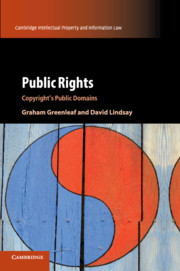Book contents
- Public Rights: Copyright’s Public Domains
- Cambridge Intellectual Property and Information Law
- Public rights
- Copyright page
- Contents
- Foreword
- Preface
- Acknowledgements
- Table of Cases
- Table of Legislation
- Table of International Instruments
- Part I What is the Copyright Public Domain?
- Part II Constraints and Supports, Global and National
- Part III Public Domains: Categories of Public Rights
- 7 Works Outside Copyright Protection – Part I
- 8 Works Outside Copyright Protection – Part II
- 9 Works Where Copyright Has Expired
- 10 Non-Infringing Uses of Protected Works
- 11 Copyright Exceptions and Limitations – Comparative Approaches
- 12 Copyright Exceptions and Limitations – Categories
- 13 Compulsory Licensing – Variations
- 14 Compulsory Licensing – Subject Areas
- 15 Voluntary Licensing Creating Public Rights
- 16 The De Facto Public Domain – Internet-Enabled Public Rights
- Part IV Conclusions
- Bibliography
- Index
- Cambridge Intellectual Property and Information Law
13 - Compulsory Licensing – Variations
from Part III - Public Domains: Categories of Public Rights
Published online by Cambridge University Press: 07 June 2018
- Public Rights: Copyright’s Public Domains
- Cambridge Intellectual Property and Information Law
- Public rights
- Copyright page
- Contents
- Foreword
- Preface
- Acknowledgements
- Table of Cases
- Table of Legislation
- Table of International Instruments
- Part I What is the Copyright Public Domain?
- Part II Constraints and Supports, Global and National
- Part III Public Domains: Categories of Public Rights
- 7 Works Outside Copyright Protection – Part I
- 8 Works Outside Copyright Protection – Part II
- 9 Works Where Copyright Has Expired
- 10 Non-Infringing Uses of Protected Works
- 11 Copyright Exceptions and Limitations – Comparative Approaches
- 12 Copyright Exceptions and Limitations – Categories
- 13 Compulsory Licensing – Variations
- 14 Compulsory Licensing – Subject Areas
- 15 Voluntary Licensing Creating Public Rights
- 16 The De Facto Public Domain – Internet-Enabled Public Rights
- Part IV Conclusions
- Bibliography
- Index
- Cambridge Intellectual Property and Information Law
Summary
- Type
- Chapter
- Information
- Public RightsCopyright's Public Domains, pp. 392 - 432Publisher: Cambridge University PressPrint publication year: 2018



